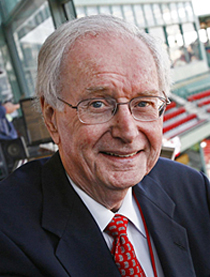
Culture
The official definition of a no-hitter is "a game in which a pitcher or pitchers complete a game of nine innings or more without allowing a hit."

Flavin
Do you suppose Eliot from Jordan's Furniture is getting a little edgy these days? More to the point, has anyone checked his insurance man's blood pressure lately?
Baseball has witnessed an unprecedented rash of no-hit games in the first two months of this season -- six, so far, and the modern record (since 1900) for a full season is only seven. It's a good bet that it will be broken -- no, obliterated this year. This wouldn't matter much, except that Eliot, Jordan's CEO, was all over TV and radio in April and May, promising to give a full rebate on anything bought at Jordan's between April 14 and May 23 if the Red Sox pitch a no-hitter between August 3 and October 3 when the regular season ends. It's still a pretty good bet that it won't happen -- only once in the last 56 years have they thrown a no-hitter in the specified August-October time frame (Clay Buchholz on Sept. 1, 2007). There have been no Red Sox no-hitters at all for 13 years (Jon Lester, 2008). Still, there's a chance that it could happen.
This is the list of no-nos this season to date: Joe Musgrove of the Padres, versus the Texas Rangers, April 9; Carlos Rodon of the White Sox versus Cleveland, April 14; John Means of the Orioles versus Seattle, May 5; Wade Miley of the Reds versus Cleveland, May 7; Spencer Turnbull of the Tigers versus Seattle May 18; and Corey Kluber of the Yankees versus Texas, May 19.
Of the six no-nos that took place even before June began bustin' out all over, two each were twirled against Cleveland, Seattle, and Texas, all American League teams. No team has ever been victimized three times in a single season, so stay tuned. We're not even counting a seventh no-hit game, which was thrown this season by Madison Bumgarner of the Arizona Diamondbacks against the Atlanta Braves on April 25. It was the second game of a doubleheader, though, and they are, by rule since 2020, only seven innings long. The official definition of a no-hitter is "a game in which a pitcher or pitchers complete a game of nine innings or more without allowing a hit." So Bumgarner, although credited with a complete game shutout, does not get credited with a no-hitter.
What is the reason for the sudden influx of no-nos? It has to be related to the corresponding rise in strikeouts that have been plaguing the game in recent years. Pitchers are throwing harder than they ever have, and hitters have been swinging from the heels more than ever before, even in two strike counts. Ted Williams, with two strikes against him, would choke up slightly on his bat and cut down on his stroke a bit. Not modern day batters, though. There is no longer any shame in striking out. It's all or nothing with batters today, and more often than not it turns out to be nothing. When a guy strikes out, he doesn't even put the ball in play, which negates even the faintest chance of a hit. Even a weak ground ball could find a hole in the infield or be beaten out for a hit.
Batting averages are at an all-time low of .237 this year. It used to be that calling someone "a .240 hitter" was to disparage him; now it means he's hitting above the league average. It's been estimated that infield shifts are responsible for taking about 12 points off of a player's batting average, so there is a growing sentiment to outlaw them. But if a second baseman moves to the left of second because that's where a guy is likely to hit the ball, shouldn't it be incumbent upon the batter to aim for the spot where the defender just vacated rather than to make it illegal for the guy to shift his position? Besides, banning shifts doesn't address the larger problem of too many strikeouts. If a team strikes out an average of nine times a game, that's one third of the total outs that they make in an entire game. It's no wonder that there's been such a spike in no-hitters.
On the other side of the equation, it's one thing for a pitcher to throw a no-hitter, and another to get credit for it. Most famously, there was the case of Armando Galarraga, a journeyman pitcher for the Detroit Tigers. On June 2, 2010, he threw a perfect game against the Cleveland Indians. Or did he? With two outs in the ninth, he enticed Jason Donald of the Indians to hit a soft grounder to first baseman Miguel Cabrera, who ranged his right to field it and made the feed to Galarraga covering first to complete the masterpiece. It was a done deal, except that umpire, Jim Joyce, called the runner safe. Donald was clearly out -- even he knew it; but in the days before replay challenges were allowed, the umpire's call was the final word -- whether he had blown it or not. In this case, Joyce blew it big time. When he saw the replay, he was so appalled that he immediately issued an apology to Galarraga. But what was done was done, and Galarraga is credited in the record books with neither a perfect game nor a no-hitter.
When he was 23 years old with the Montreal Expos, Pedro Martinez threw a perfect game for nine innings against the San Diego Padres, but gave up a double in the 10th and got no credit for either a perfect game or a no-hitter.
In perhaps the greatest pitching performance ever, in 1959, Harvey Haddix threw a perfect game for 12 innings against the Braves but lost it all in the 13th when a bad throw cost him the perfect game, and a home run cost him the no-hitter and the ballgame. As an aside, even the home run that night, hit by Joe Adcock, only counted as a double because one of the baserunners -- Henry Aaron, of all people -- didn't run it out.
In any case, you don't have to worry too much about either Eliot or Jordan's Furniture, they took out an insurance policy to protect them if the Sox do throw a no-hitter in the last two months of the season. As for the insurance man -- well, that's another matter.
- Dick Flavin is a New York Times bestselling author; the Boston Red Sox "Poet Laureate" and The Pilot's recently minted Sports' columnist.
Recent articles in the Culture & Events section
-
Joyful hopeMichael Reardon
-
Scripture Reflection for Jan. 5, 2025, The Epiphany of the LordDeacon Greg Kandra
-
Tolkien's world, still popular on the big screen, began with faith and wordsCecilia Hadley
-
Scripture Reflection for Dec. 22, 2024, Fourth Sunday of AdventDeacon Greg Kandra
-
Getting adult children to Christmas MassGreg Erlandson


















